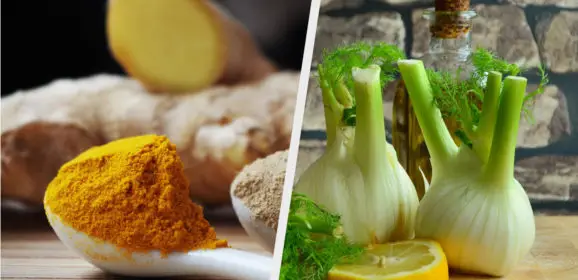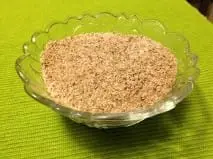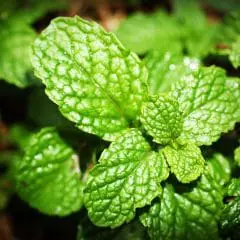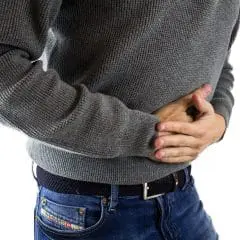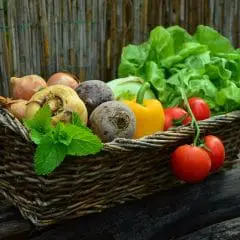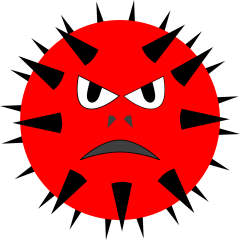Hulda Clark Constipation Tea
Here’s Hulda Clark’s Constipation Tea from her book “The Cure for All Diseases“, p. 548 by Hulda Regehr Clark, PhD, N.D.
Constipation is often caused by E.Coli and Salmonella from dairy foods, or from killing “good” bowel bacteria with antibiotics (killing a few by zapping actually restores good flora). Eat foods that restore the body’s good bowel flora: vegetables, sterilized milk (the milk sugar is essential), lots of water.
There are a lot of remedies for constipation, but many people enjoy this tea:
1 Tablespoon senna tea leaves
1/2 tsp mint leaves.
1 quart water (4 cups)
Boil for 1 minute. Add a dash of Vitamin C and brown sugar to taste.
Sip through the day to avoid “belly-ache”. It can take years for the body’s flora to “right themselves” after an antibiotic session. Be patient.
We recommend this type of constipation remedy occasionally, but for the longer term we recommend getting to the root of your constipation issues, and working with your gut, fiber, enzymes, live raw food, fermented foods, and any other way to establish good bowel movements.
14 Constipation Home Recipes
Here are some easy ways to cleanse your colon naturally. Commercial laxatives are not healthy and are actually harmful in the long term.
Diet and lifestyle changes made consistently over time will help you to become regular. Please read through this list and find something that works for YOU!
1. Add more fiber to your diet. We need both Soluble Fiber and Insoluble Fiber. Soluble Fiber is the kind that turns to gel in the intestines and helps to soften stool. Insoluble Fiber is roughage that is found in bran and many fruits and vegetables. See the Fiber Cookie recipe and adapt the ingredients to suit your family’s diet.
Going Beyond the Cleanse
Cleansing is not a magic bullet, or a one-time thing. It actually happens as you live a healthy lifestyle with a healthy diet. A healthy diet is primarily plant food, living food. Living food nourishes the cells that make up your body. Occasional cleansing between stints of binge eating of dead, fast food, is not a path for good health.
Following are Excerpts from “Back to the Garden” magazine, March/April 2007. Going Beyond the Cleanse by Michael Donaldson, PhD.
Constipation is a major issue in America. More than 4 million Americans have frequent constipation and spend $725 million on laxative products each year. Constipation is more than just annoying. If your colon isn’t working right, toxins tend to get reabsorbed by the body. Three separate studies among Japanese, African Americans, and Caucasians show that people who suffer from constipation or use laxatives very often have at least a 200 percent increased risk of colon cancer.
Along with constipation, several other common health issues in the intestinal tract (ulcerative colitis, Crohn’s disease, diverticular disease, hemorrhoids, and irritable bowel syndrome) affect about 16 million people in America.
So many of us have unhealthy digestive tracts. What do we do to regain our health in this area? The good news is that whatever helps our intestinal tract also helps the rest of the body, so it is a win-win situation. There isn’t one treatment for the heart, another for the lungs, a third for the immune system, and so on. What is healthy for one part is healthy for the whole body. What damages one part hurts the whole body.
Dr. Donaldson lists some major components in a healthy person’s life – going beyond the basic cleanse. It is the diet that supports colon health day in and day out.
- Exercise – this stimulates peristalsis and helps with all areas of our health.
- Fruits & Vegetables – essential for fiber, softer stools, finding up cholesterol, detoxifying chemicals from the liver, vitamins & minerals providing essential nutrition for the cells.
- Vegetable Juices – helps any inflammation in the bowel, where the lining in the GI tract can be replaced naturally in 4 days.
- Meat – bad for you, avoid it.
- Water – keep urine a pale pink color which indicates that you have consumed enough liquid.
- Flax – good source of soluble and insoluble fiber plus essential fatty acids and other antioxidant properties.
- Omega 3 Fats – fights inflammation in the body.
- Vitamin D – lack of Vitamin D has been related to some cancers and heart disease.
- Probiotics – beneficial bacteria are our first line of defense, strengthening the immune system, also aiding in fighting inflammation.
- Body, Soul, Spirit – Freedom and healing is having a deep relationship with Jesus Christ.
[Michael Donaldson, Ph.D. is Research Director of the Hallelujah Acres Foundation. His research studies have been published in many medical and nutrition journals, including BMC Complementary and Alternative Medicine, Nutrition & Food Science, and Nutrition Journal.]
Note from Lyn: My most recent constipation remedy is quite simple. Anyone who has never gotten relief from the traditional constipation formulas can try this simple DIY recipe.
Creamsicle Constipation Remedy:
1 heaping teaspoon beet powder (often found in health food stores, or online)
1 rounded tsp magnesium (I use “Calm” powder)
1-2 tsp acacia fiber powder (found in health food stores)
Mix these 3 ingredients together and place in a large glass. Add approx. 1/3 cup of lukewarm/warm water to begin activating the mixture. The mixture will become a light pink foam. Add approx. 1/2 cup of room temperature water and keep mixing. Drink it down. Chase it all down with another glass of water.
This is the most delicious constipation drink I have ever tasted. I find it begins working right away and good results often happen by the next day. I find that taking this Constipation mixture mid afternoon on an empty stomach works well. I hope you find it as tasty and effective as I do!
Constipation’s Dark Side
Did you know that constipation’s dark side could include Parkinsons? The more we know about the gut, the more we realize that it truly is our second brain in action, and its importance is right up there with the liver. Cleansing always begins with moving toxins out of your body, and you will feel so much better when you do. I have heard of headaches, tiredness, bad mood, and all sorts of aches/pains gone after going to the bathroom. It’s a quick mood lifter!
Here is an article/newsletter I found somewhere by Robert J Rowen, M.D, and how constipation can affect so many systems of the body.
“Did you know that the number of times you visit a bathroom every day can determine your risk of Parkinson’s disease? I know it sounds crazy, but it’s true.
I had a patient several years ago who suffered from an extreme case of Parkinson’s disease. But, strangely enough, she would make a dramatic recovery any time she had a bowel movement. One day, she could walk around and function quite normally. The next day, though, she would have advanced Parkinson’s-like symptoms. Then she would completely recover a few days later.
This patient insisted that as long as she moved her bowels, she remained functional. If she missed a day, she would become rigid and have typical tremors of advanced disease. An enema would promptly clear it. The case was so clearly associated with constipation it made me wonder: Could Parkinson’s and constipation possibly be related? And sure enough ….
As part of an ongoing long-term (24 hour) study, a research group recently confirmed what I’ve long suspected. They found that many cases of Parkinson’s disease can be linked directly to constipation.
Over 8,000 men participated in the study. The researchers divided the men into four different groups according to how many bowel movements they had each day (less than one, one, two, more than two). Their results showed that your risk of developing Parkinson’s is four-and-a-half times greater if you have less than one bowel movement per day versus having more than two.
The authors believe that degeneration in the central nervous system causes constipation. And as that degeneration progresses, it might also lead to Parkinson’s.
I have a different theory: I think the constipation itself leads to damage to your nervous system. Here’s why: I’ve long known that bacterial toxins absorbed into your bloodstream from your gut will directly attack the cells in your nervous system. We also know that pesticides contribute to the development of Parkinson’s. This study reconfirms suspicions that toxins damage these controlling nerve cells.
Millions of men and women are developing this crippling disease. By the time symptoms manifest, the damage has been done. I believe the majority of cases can be prevented. All you have to do is eat organic foods, which eliminates your intake of pesticides, and increase the amount of fruits and vegetables in the diet. This gives you better bowel function and larger stools, minimizing the amount of time the toxic material is in contact with your colon.
You can get additional protection by taking plenty of antioxidants, particularly vitamins C and E. I also recommend the mineral selenium. All of these help maintain and recycle abundant levels of glutathione, your body’s principal detoxifier. And, finally, reduce your heavy metals and iron with chelation therapy.
The best management of Parkinson’s disease, like most chronic degenerative conditions, is prevention. It doesn’t have to happen!
Yours for better health and medical freedom,
Robert Jay Rowen, MD

